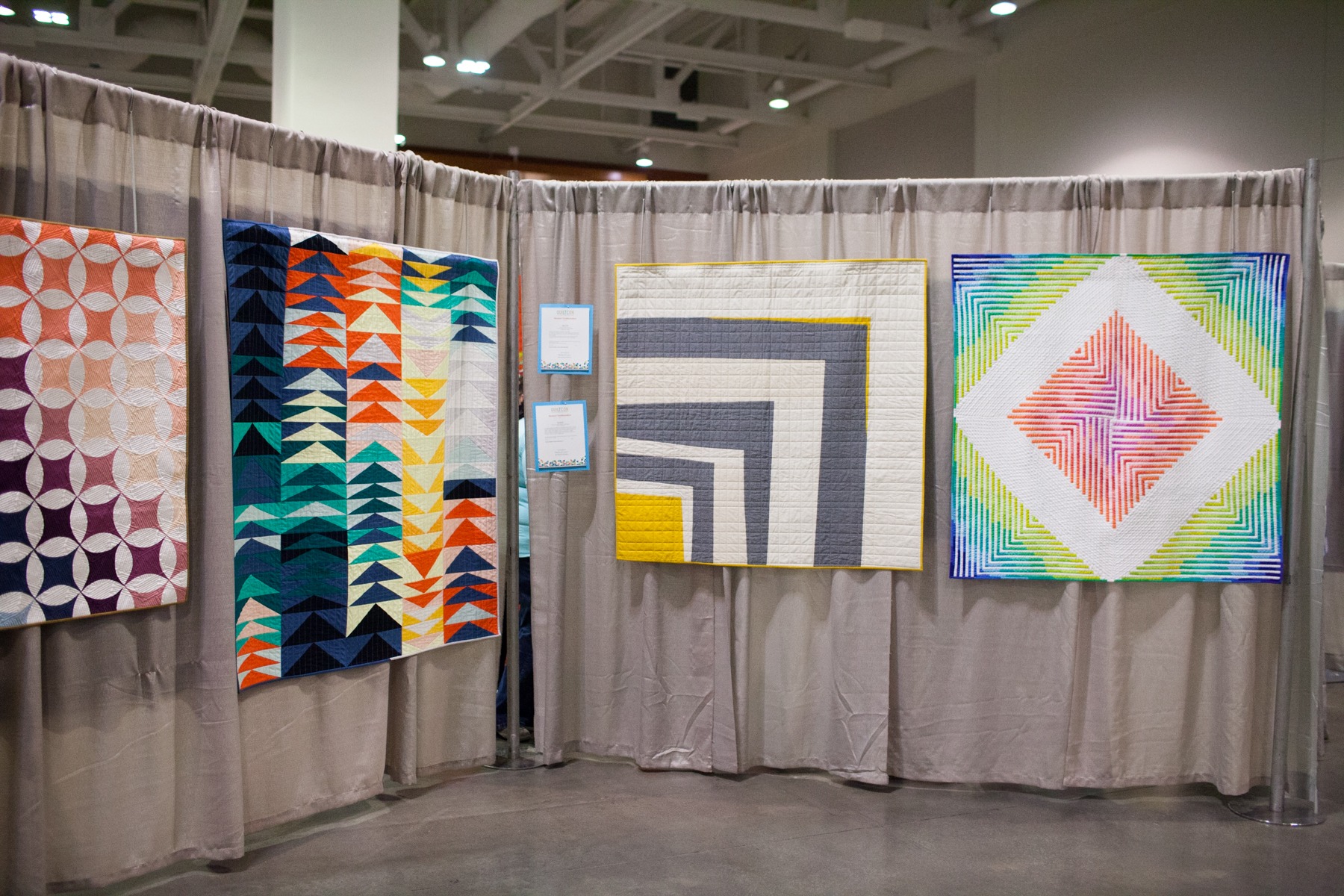
I have done my best to appropriately credit makers. However, please do not hesitate to contact me with questions or comments about quilt makers.
QuiltCon is a whirlwind four days of quiltiness overload. Experiencing QuiltCon may be on many modern quilters’ bucket lists. If you ever have a chance to go, take it. You will come away with a “QuiltCon hangover” full of inspiration and knowledge. I will discuss the things that I took away from the quilt show at QuiltCon 2019. This is an editorial review by just one attendee.
THE SHOW STOPPERS
There is always a class of quilts that are the most photographed at each QuiltCon. I call these quilts the “show stoppers.” The photographs of these quilts are as fabulous as the quilts themselves. Each of these quilts glow and the people gravitate towards them during the show. Everyone wants a picture so they can share it on their own blog/social media/instagram. Here are just a few of some of the amazing quilts that I consider show stopping.
Best In Show – Smile, Group or Bee Quilts, By Leann Chahley @shecanquilt
Judges Choice – Anne Sullivan
Some Things are Not Easily Seen : Poverty, Quilting Challenge – Two Color, By Katheryn Upitis @kupitis
At the Junction, Improvisation, By Marla Varner @pennylanequilts
1st Place Group or Bee Quilts, Overlapped, By Alisa Kutsel, Friederike Stanke, Vicky Mueller, Melanie Meyer, Monique Disney, Katharina Begerl, Christine Joubert, Lucy Engels, Saija Kiiskinen, Lisa Hofmann-Maurer
Badass Quilt, Piecing, By Berene Campbell @happysewlucky
People’s Choice, Piecing, Separated, By Valerie Luberecki @valbetweenquilts
Piece of Cake, Modern Traditionalism, By Ann Feitelson @feitelsonann
MY QUILTS
I was lucky to have two quilts accepted to the show. They were displayed in the Quilting Challenge : Two Color exhibit and in the Handwork category.
TRENDS + SURPRISES
I came away with the impression that there were several apparent trends at QuiltCon among the quilts on display. I first noticed that almost every quilt fell within two groups, bright bold colors or earthy neutrals. The bright colors were clean and clear and often paired with other bright colors; less often paired with neutrals. The earthy fabrics tended towards ecru, blush, and copper tones. Those quilts felt light and delicate. Very few quilts crossed into both groups and even fewer fell outside of these classifications.
A second trend I noticed was the lack of the solid white expanse. I think that ship has sailed. The piecing and color/fabric selection of today’s modern quilts is much more sophisticated than just leaving a blank canvas. Within the minimalist design and the negative space categories, the space was filled with detail, texture, and color.
Even when the quilt appears to be just blank “white” it is actually filled with piecing and quilting details, such as in these three quilts:
Stephanie Ruyle @spontaneousthreads
Heidi Parkes @heidiparkes
Jennifer LaMastra @jenlamastra
I was surprised at the amount of printed fabrics included in the show quilts. So much of my view of a show-worthy “modern quilt” included solid fabrics. There were still many quilts that used only solid fabrics, however, at least a third or more of the quilts in the show contained prints. Most of the quilts that contained prints did also use solid fabrics. The printed fabric added depth, texture, and dimension. I am happy about this trend and am looking forward to exploring it in my own quilts.
Melissa Everett @mne_textiles
Deborah Jalbert @madeofhonorquilts
Billi Rakov @BilliRakov
Wendy Hill @wendyquilter
Sarah Hibbert @quiltscornerstone
The last trend that stood out to me, and I have also mentioned several times, is texture and dimension. There was so much dimension in these two-dimensional works that I am glad I was able to see them in person. Makers used quilting thread weights, colors, and size of stitches to create depth and differentiate areas of the quilts’ design. There were a lot of linens, wovens, and shot cottons. Where fabrics appear as solids there is actually a lot of texture. There was even some use of fabric to create 3-dimensional components. I am including only a very few photographs of quilts that demonstrated texture and dimension.
Katherine Jones @twocatsquilts
Karen Maple @KarenMaple
Applique
Jen Broemel
Carson Converse @carsonconverse
Jack Weise
Alexis Deise @alexisdeise
Jane Willis @twiggyandopal
Tara Faughnan @tarafaughnan
Catherine Redford
CATEGORIES + ACCEPTANCE
One last thing I came away from QuiltCon with is the overwhelm of the sheer volume of quilts in the show. There were most definitely over 500 quilts hanging if you include special exhibits and charity quilts. Unfortunately, I did not get to see every quilt in the show. And as far as large, international quilt shows are concerned, QuiltCon is actually pretty small.
There are 12 categories that you can enter your quilts into. There seemed to be a lot of crossover between categories, many quilts would qualify for many of the categories. The entrant selects the category to submit to, besides Small Quilts and Youth which is determined by size and age, respectively. It seemed like the largest categories were Modern Traditionalism, Piecing, and Quilting Challenge : Two Color. Even those categories probably had less than 50 quilts each on display. The smaller categories were Group or Bee Quilts, Handwork, and Applique. Professional quilters have quilts hanging alongside amateur and hobbyist quilters. Everyone is judged and juried into the same show.
The youth category is determined by age, and most of us aren’t young enough to qualify. However, many of the youth quilts fell more towards art quilts with the use of textiles to create pictures or portraits. It is nice to see youth excited about the art of quilting.
It’s really up to fate if your quilt is selected to hang in the show. If your quilt isn’t accepted one year, there’s a good chance it may be selected in another year. The skills, techniques, and quality of the quilts that I saw in the show is attainable by anyone who puts their mind to it.




